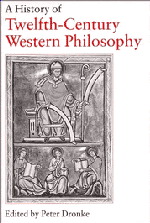Book contents
- Frontmatter
- Contents
- Preface
- Contributors
- List of abbreviations
- Introduction
- I Background
- 1 Philosophy, cosmology, and the twelfth-century Renaissance
- 2 The Platonic inheritance
- 3 The Stoic inheritance
- 4 The Arabic inheritance
- II New Perspectives
- III Innovators
- IV The Entry of the ‘New’ Aristotle
- Bio-bibliographies
- General Bibliography
- Index of Manuscripts
- General Index
3 - The Stoic inheritance
Published online by Cambridge University Press: 01 June 2011
- Frontmatter
- Contents
- Preface
- Contributors
- List of abbreviations
- Introduction
- I Background
- 1 Philosophy, cosmology, and the twelfth-century Renaissance
- 2 The Platonic inheritance
- 3 The Stoic inheritance
- 4 The Arabic inheritance
- II New Perspectives
- III Innovators
- IV The Entry of the ‘New’ Aristotle
- Bio-bibliographies
- General Bibliography
- Index of Manuscripts
- General Index
Summary
From the third century bc until approximately the third century ad, Stoicism was the principal philosophy of the Graeco-Roman world. Within the Roman sphere its position was even more prestigious than in Greece, in the sense that it could number among its proponents some extremely eminent statesmen: the younger Seneca, sometime adviser to the Emperor Nero, and the Emperor Marcus Aurelius himself. Stoicism was a system of compelling originality and coherence, marked by striking and characteristic doctrines: that, for the wise man, pleasure and pain (to say nothing of riches and reputation) were matters of indifference, as was death itself (hence, for the Stoic sage, suicide was in some cases a commendable option); that the wise man was to live in accord with nature, which was defined as an all-pervasive divine and fiery spirit that penetrated, animated, and unified the universe, and periodically consumed it. Thus nature, the universe itself, and the godhead were regarded as one and identical, and were conceived of as material. As this spirit penetrated the universe spatially, so it had temporal extension, which linked all events together in an inexorable chain of fate, which it was the wise man's obligation to contemplate and understand, but which he was powerless to alter or control.
- Type
- Chapter
- Information
- A History of Twelfth-Century Western Philosophy , pp. 81 - 112Publisher: Cambridge University PressPrint publication year: 1988
- 10
- Cited by



